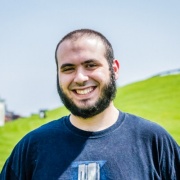Hatem Nassrat

Educational background
- Master of Applied Computer Science, ºÚÁϳԹÏÍø
- Bachelor of Computer Science, ºÚÁϳԹÏÍø
Current position
- CTO and Cofounded,
- Board Member, (DNS)
Tell us about your educational and career background to date.
I started my bachelor's degree in 2002 at the American University in Cairo (AUC) and transferred to Dalhousie's Bachelor of Computer Science program in my third year (2004). I received my bachelor's degree at the age of 20 in 2006.
Following that, I had a summer internship at the D-Drive Lab at ºÚÁϳԹÏÍøFCS and decided to continue my education by enrolling in the Master of Applied Computer Science program in September of 2006. In the summer of 2007, I decided to take on a full time job, started as a contractor for a startup based in Germany and moved on as a Software Engineer at GenieKnows Inc. From there, I worked at Keane Canada (now NTT Data Americas) as a Senior Consultant and then returned to Genieknows Inc. as their CTO.
I was both working full time and completing my master's degree. Due to logistic issues as well as time, I ended up defending my thesis in April 2009 and receiving my master's degree in May 2009. At that time I was employed full time with NTT Data.Â
What are some of the things you do in your job?
In my capacity as CTO of LeadSift, I am responsible for architecting and designing the solutions to the problems we are solving. These solutions include technologies in Natural Language Processing, Information Retrieval, Data Mining, Databases, and Web services. They also involve deploying these technologies for high scalability and load to be able to handle the volumes of posts available on social media.
The general goal of Digital NS is growing the technology sector in Atlantic Canada. In my capacity as a board member, I assist in overseeing and supporting the general activities of DNS.
What are you most passionate about as it relates to what you do now?
What I enjoy most is solving some of the hard problems in new and innovative ways. For example, we recently implemented a fast drill down and aggregation system that is consistently faster than aggregation systems available in all the major database systems available and much more efficient than OLAP systems. We required such a system to be able to build a BI tool that allows us to drill down millions of records and tens of thousands of dimensions.
How did you end up where you are today?
My educational background helped give me credibility when applying for jobs. What I gained from my degree is a very solid foundation in Algorithms, Computer Design Principles, and General Computing.Â
During my educational career I was able to secure part-time software development jobs during the educational breaks. Due to my transfer from Egypt, I was unable to align with the undergraduate co-op program at ºÚÁϳԹÏÍø(which i highly recommend), the part-time jobs helped cover for me missing out on the co-op program.
Dalhousie, as well as many universities across canada, have started to incorporate more courses that educate students about real-world computing and projects. These kinds of courses should help students get more accustomed to what it means to write real world computer applications using current software development principles such as agile software development. The incorporation of ShiftKey Labs at ºÚÁϳԹÏÍøwill help give students assistance and support to build innovative technologies that the world needs.
What are some of the neatest things you’ve been involved with in your career so far?
Starting LeadSift is currently the highlight of my career. It is a great learning experience from the business side of things. As one of our investors / advisors tells us, as founders of LeadSift, that experience counts as an MBA.Â
What are some of your fondest memories about your time in Dal’s MACS program?
My fondest memories as a MACS student would have to be the long nights working on completing my degree requirements and course projects. The courses as well are extremely well designed as they encourage research and self education.
 What has really stuck with you from your time in Dal’s MACS program?
Mostly my affinity towards going back to continue my educational career. As part of my future goals, I am considering enrolling in PHD possibly related to information retrieval.
